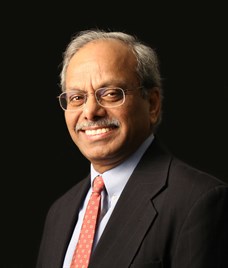 “Close your eyes and imagine you are living 200 years from now. Get up in the morning and you are not allowed to touch fossil fuels,” is the contemplative daydream of Dr. Rakesh Agrawal, distinguished professor of chemical engineering at Purdue University, master inventor and revolutionary thinker who simply cannot help himself, he said, in elevating the discussion of energy solutions and the everyday challenges a solar economy would resolve.
“Close your eyes and imagine you are living 200 years from now. Get up in the morning and you are not allowed to touch fossil fuels,” is the contemplative daydream of Dr. Rakesh Agrawal, distinguished professor of chemical engineering at Purdue University, master inventor and revolutionary thinker who simply cannot help himself, he said, in elevating the discussion of energy solutions and the everyday challenges a solar economy would resolve.
Agrawal gave the prestigious fall public lecture for Texas A&M’s Institute for Advanced Study, for which he is a current Faculty Fellow. He addressed the plight of finite energy sources in light of practical, societal needs and the impact of which that has influenced progress and modernization, spanning the history of the human race.
“We meet all our needs with fossil fuels—whether it is heat, electricity, fertilizers to grow food, transportation, chemicals—everything is associated with fossil fuels. Fossil fuel sources will dwindle eventually, because the rate at which we consume them is much faster than the rate at which they are made. It took millions of years to make them and we use them just like that,” Agrawal said, with the snap of his fingers.
No one can know with certainty when the resources will be fully depleted, he acknowledged. When it does happen, however, Agrawal wants to know how the aforementioned needs will be met.
“How will we have electricity around the clock? Go from place A to B, between long and short distances? How will we power our mobile devices, power the room, air condition the room, create fertilizers to grow food and convert carbon molecules into furniture, clothing?” he asked. “These are some of the big challenges of the future and I along with my researchers spend a lot of time dreaming about it. We then model [our theories] for the creation of new systems in a solar economy.”
To begin, methodologies would need to exist to efficiently harness solar energy, convert it and then store it. Given that solar energy is rather dilute, one would need 20 to 40 football fields of space in order to match the rate at which a car tank is filled with gas, Agrawal said. Efficiency in cost and the system itself (operationally) is of predominate importance; otherwise, covering that amount of space “would be an expensive affair.” Lastly, the availability of the sun—being limited to certain portions of the day—impacts the decisions and solutions of the solar economy model.
“Anything big, especially something [like a solar economy] has to start small," he said.
Fossil fuels have changed us forever in many positive ways, Agrawal continued, adding his theory that future generations will adapt to new energy solutions as they simultaneously hold onto familiar conveniences of modern technology.
The time to create an action plan for the day when fossil fuels are depleted is now, he said. “Otherwise, what’s going to happen is you’ll be there and you won’t have a solution."